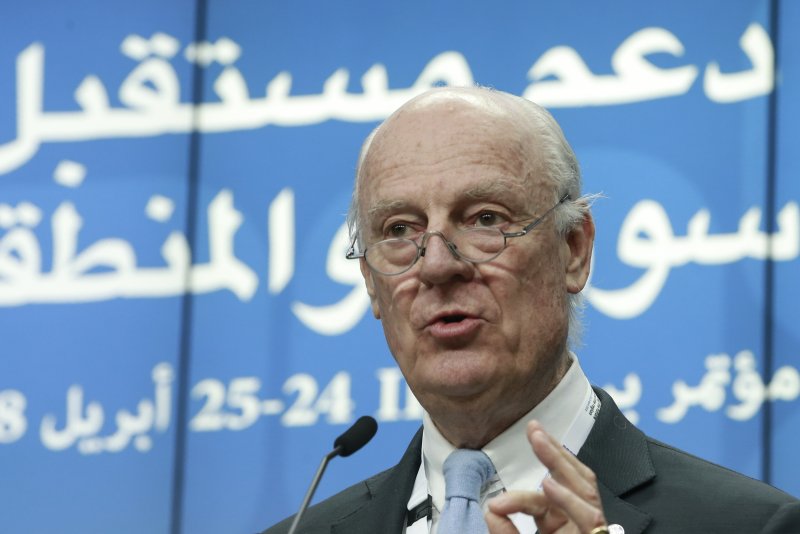United Nations Special Envoy for Syria Staffan de Mistura gives a press conference to present first results of conference on 'Supporting the future of Syria and the region' at EU council headquarters, in Brussels, Belgium, on April 25. File Photo by Olivier Hoslet/EPA-EPE
Oct. 24 (UPI) -- On Tuesday, the U.S. State Department announced that Mike Pompeo met with the U.N. special envoy to Syria Staffan de Mistura to discuss the progress on "convening a constitutional committee" for the country.
However, the time is not ripe for a final constitution.
For the constitution to lay down the foundation for a state that will bring stability and prosperity to the country, it should be inclusive and representative of the Syrian people and their aspirations. In short, in order for the constitution to work well, it should fit the Syrian people. Who knows what suits the Syrian people and who knows what the Syrian people really want?
The most logical answer would be the Syrian people themselves. This is a mantra that different world leaders keep on repeating. Even Russian President Vladimir Putin said that only the Syrian people are entitled to decide the future of Syria. But who represents the Syrian people? President Bashar al-Assad, the jihadist groups, the opposition in exile who are flooding the satellite channels and giving hypothetical views on the situation on the ground? None of those is truly representative of the Syrian people.
Does the intellectual who has been living in exile for years in Paris truly know the plumber who has been driven out from his home in Zabadani? Not really. No one can claim to know what the Syrian people want. Actually, for now, the Syrian people themselves don't know what they want.
From the various interviews I conducted with refugees in Lebanese camps, I could gather one simple fact: They want stability and to go back home. However, they don't know how to achieve that.
Helping them does not mean guessing what they want or what suits them but preparing them to make an informed decision. This is why it is important not to repeat the mistakes of Iraq. Following the fall of Saddam Hussein, the United States -- with the naïve idea of putting in place a Jeffersonian democracy -- called for elections. Nevertheless, the years of dictatorships did not allow for local political figures to emerge.
As a result, the Iraqi people, with a limited choice, elected clerics with ties to Iran, as well as corrupt figures who bought their way to the ballot. Additionally, the United States, with little knowledge of the fabric of Iraqi society and its dynamics, put in place a constitution that compartmentalized people into Shia Sunni and Kurds. This enforced the sectarian divisions in the country.
Today, the United States calls for free elections in Syria. This is not going to happen as long as Assad is in power. We have to remember that there have always been elections in Syria and guess what? Not to anyone's surprise, Assad used to win with a 99.99 majority. Actually, it is known that two secret service officers (Mukhabarat) stand behind every person casting his vote in order to make sure he or she chooses Assad.
Even if the international community ensures an environment free from "Mukhabarat," the psychological element will still be there. As long as Assad is in power, no one will dare to vote for anyone else. On the other hand, similarly to Iraq, the Assad regime did not allow for local political figures to blossom. Even if Assad is gone and elections are held today, chances are that the results are going to be a mix of Baathists and jihadists, who are not likely to drive any national reconciliation.
Again, the question is what is to be done? The best solution is to allow for an environment where local political figures representative of the grass roots can blossom, as well as to nurture an environment that is conducive to a national reconciliation.
There is no better place to start such an endeavor than the local communities. This is why the local councils are only ray of hope to put the country back together. The local councils that emerged during the war to provide basic services to the local communities -- when the government stated retracting them as a form of collective punishment -- are the best incubator for local political figures and for national reconciliation. Actually, they constitute a point on which an agreement with the Russians can be reached.
The Astana process recognizes the legitimacy of the local councils. Through the reconstruction process, coupled with capacity-building of the local councils, political figures can emerge and reconciliation on a local level can be conducted, leading to a national one. At the end of this process, which is likely to take an average of five years, the Syrian people will be able to make an informed decision.
The right time to hold elections is once the country is rebuilt, a solid civil society has been nurtured, and a national reconciliation conducted. The elected parliament can then draft a final constitution that is inclusive and representative. The election and the constitution should come as an end to the bottom-up political process, not as its beginning. This is the hard way to solve the crisis. However, it is the right way to ensure national reconciliation and sustainable stability and peace.
Dania Koleilat Khatib is executive director of the Al Istishari Al Strategy Center for Economic and Future Studies, a UAE-based independent think tank. She specializes in U.S.-Arab relations and researches sectarianism, extremism and governance. Her book "The Arab Lobby and the U.S.: Factors for Success and Failure" was published by Routledge UK and translated to Arabic.















